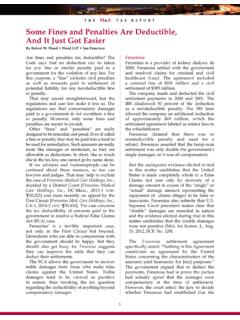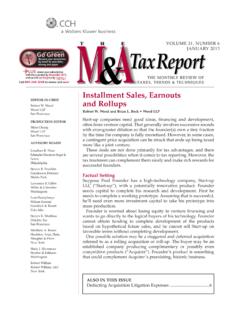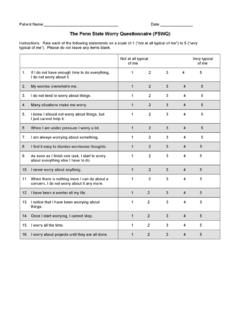Transcription of Tax Deductions for Damage Payments: What, Me Worry?
1 Tax Deductions for DamagePayments: what , Me Worry? By Robert W. WoodIt is axiomatic that when businesses are sued and payout settlements and judgments, they expect to do so on adeductible basis. That is especially true in America,where litigation is simply a cost of doing business. Itshould come as no surprise that there has never beenserious question about the deductibility of lawyers feesor settlement payments to resolve , some types of payments in that context raisecapitalization issues. For example, a lawsuit (and legalexpenses) over title to property must be capitalized andthen deducted ratably over the life of the asset. Thoseoddities aside, in the vast majority of cases, we deduct slip-and-fall cases, suits by employees, suitsby shareholders, and suits with customers and the general rule is that payments in abusiness context (either by way of settlement or judg-ment) are deductible, there is one flat no-no.
2 The InternalRevenue Code expressly denies a deduction for any fineor similar penalty paid to a government for the violationof any law. 1 That includes criminal and civil penalties,as well as sums paid in settlement of potential liability fora is the latter element of the provision that oftencauses great controversy. It may (or may not) be clear thatthere is a likelihood of a fine being imposed when a potential liability is you think there aren t huge dollar swings in thatcontext, think again. Exxon s $ billion Alaska oil spillsettlement actually cost Exxon no more than $524 millionafter recently, Marsh & McLennan agreed tofork out $850 million to settle civil fraud charges broughtby New York Attorney General (and New York guberna-torial hopeful) Eliot tax deduction was Wall Street Journalnoted it, saying that Marsh& McLennan looks likely to end up paying a lot lessthanks to a tax deduction that could shave hundreds ofmillions from the headline figure.
3 5 Given Marsh s taxrate of about 35 percent (between and foreign taxes),that tax deduction shaves more than $300 million fromthe cost of the $850 million , the tireless Spitzer got great press for his largestsettlement to date. Yet earmarking the money for restitu-tion had significant tax benefits to Marsh & (or disgorgement of profits) is generally de-ductible as a business deduction, so paying restitution is a lot less painful. That tax strategy is hardly new. Thesame ideas were at work with several headline settle-ments in the Wall Street research scandal and severalmutual fund settlements involving improper trading offund usually involve compromises of settling party who is accused of doing some wrongusually does not admit any wrongdoing in the settle-ment. In line with the hazards of litigation, paymentsmade by a settling party tend to fall between what eachparty originally hoped for at the initial stages of litiga-tion.
4 If you settle with the Environmental ProtectionAgency, the Securities Exchange Commission, or someother agency breathing down your business s neck, thepayment will presumably belessthan the asserted liabil-ity. Otherwise, you wouldn t a settlement payout truly constitutes a fine orpenalty may depend on the intent of the , the violation of law need not have beenintentional to incur nondeductibility. A fine is nondeduct-ible even if the violation is inadvertent or if the taxpayercan show that he must violate the law to operate hisbusiness Takes AimThose tax incentives (and their erosion of tax revenue)are not lost on Congress or the president. Nor is theapparent social policy gaffe presented by the fact thatCongress might be seen as encouraging bad behavior byallowing tax Deductions for reprehensible business con-duct.
5 When you add those up, it s no wonder there sconcern. On two prior occasions, the White House pro-posed a remedy to this continuing Con-gress has taken aim and may pull the $70 billion tax bill authored by Senate FinanceCommittee Chair Chuck Grassley, R-Iowa, targets dam-age section 162(f) already plainlyprohibits companies from deducting penalties assessedby (and paid to) federal agencies like the SEC, there hasrecently been controversy about settlements reached withthe government that seek to characterize payments as1 Section 162(f).2 Reg. section (b).3 Deductions Will Help Exxon Slip Away From Much of ItsOil Spill Liability, Says CRS, Highlights & Documents, Mar. 21,1991, p. , Marsh, Spitzer Settle With $850 Million, anApology to Clients, The Wall Street Journal, Feb. 1, 2005, p.
6 , Marsh s Settlement Looks Likely Eligiblefor a Tax Deduction, The Wall Street Journal, Feb. 7, 2005, p. analyst commenting on Marsh s tax position wasJustin Fuller, who covers the company for Morningstar Clinton administration s 2000 and 2001 budget propos-als both included provisions to make punitive damages nonde-ductible. Neither proposal was acted on by General Explanation of the Administration s Revenue Propos-als, Doc 1999-4614,1999 TNT 21-36; General Explanation ofthe Administration s Revenue Proposals, Doc 2000-3672,2000 TNT Tax Relief Act of 2005, S. 2020, sections 533 and 534,Doc2005-24551,2005 TNT W. Wood practices law with Robert W. Wood, , in San Francisco ( ) and isthe author ofTaxation of Damage Awards and SettlementPayments(3d Ed. Tax Institute 2005) available PRACTICE AND ACCOUNTING NEWSTAX NOTES, January 16, 2006243(C) Tax Analysts 2006.
7 All rights reserved. Tax Analysts does not claim copyright in any public domain or third party content. remedial. In contrast to fines, payments that are reme-dial or compensatory in nature are , importing deductibility characterizationcan reduce the effective cost of the payment. The pro-posed law attempts to legislate around that built-inincentive by saying that payments made in lieu of finescannot be deducted. The legislation would also barcompanies from deducting punitive Damage payments tocivil plaintiffs. The Finance Committee estimates theprovision is worth $60 million a year, a paltry number inthe great expanse of the government s fiscal , attempting to make social policy, Grassley said, A civil settlement is supposed to sting like a bee, notannoy like a gnat, and he added, Letting companiesdeduct settlement payments from their income taxestakes away the sting.
8 11 Predictably, business inter-ests have reacted negatively, claiming that such a lawmight actually discourage companies from settlingclaims with the government. Bruce Josten, chief lobbyistfor the Chamber of Commerce, argues that theprovision runs counter to the entire goal of settlingdisputes without litigation as a means of reducing theburdens on the proposed those cutbacks in 2004, severaltimes trying to add the revisions to an international taxbill, and again to a highway bill earlier in 2005. He mayhave been inspired by the Clinton administration. In 1999and again in 2000, the Clinton White House included asubstantially similar provision in its budget proposal forfiscal 2000 and New York State Bar Association produced athorough report on the deductibility of punitive damagesin analysis highlights the pros and the consof allowing deductibility, and some of its points deservemention.
9 Supporters of nondeductibility mention thesocial policy goals sought by various code provisions,including golden parachute payments, greenmail, exces-sive employee compensation, and so on. Yet, a hugeunanswered question is whether nondeductibility wouldhave any deterrent effects on defendants and how such asea change would affect juries that impose punitivedamage awards and businesses that pay of the revenue projections now integral to ourtax legislative process seem akin to witchcraft. If punitivedamages or negotiated settlements with the governmentin lieu of penalties become nondeductible, there wouldhave to be a fundamental change in the informationprovided to juries so they could take into account theafter-tax effects of punitive damages. The after-tax effectsof any settlement with the government must also (and Recharacterizing) PaymentsThere is a tendency to lump discussions of punitivedamages (paid to private parties) together with settle-ment payments made by companies seeking to avoid agovernment penalty.
10 That is unfortunate because thoseare different circumstances. In the case of a payment to agovernment, it may not be too difficult to discernwhether the payment is made as a quid pro quo fordropping the asserted penalty. Perhaps it will not be toodifficult to ferret out exactly what happened and exactlythe type of payment that is being made, verbiage , if the settling government agency freelyengages in recharacterization efforts (saying it will accepta payment to a remediation fund, for example) as ameans of disposing of a penalty assertion, why shouldthe IRS have the last say on what the payment is trulyfor? The intent of the payer is surely relevant to taxcharacterization, as is the language agreed to by theparties. Even though it is clearly not determinative, it sworth civil punitive damages are sought and the casesettles, a variety of amorphous factors may undermineany attempt to draw bright lines.

















